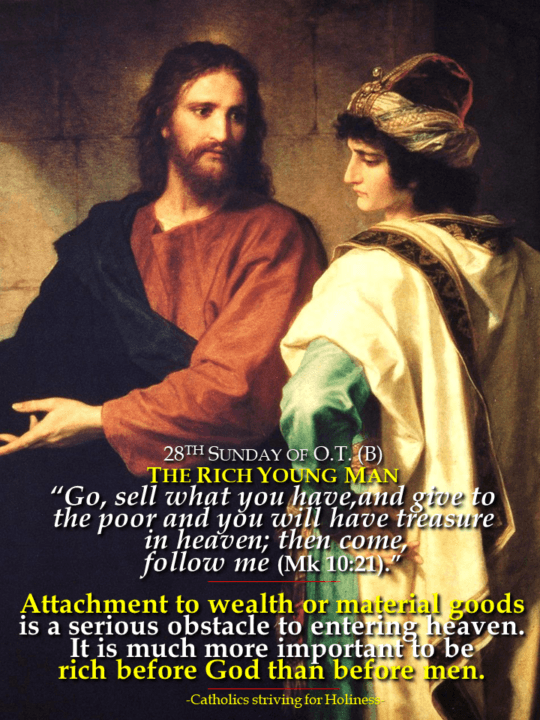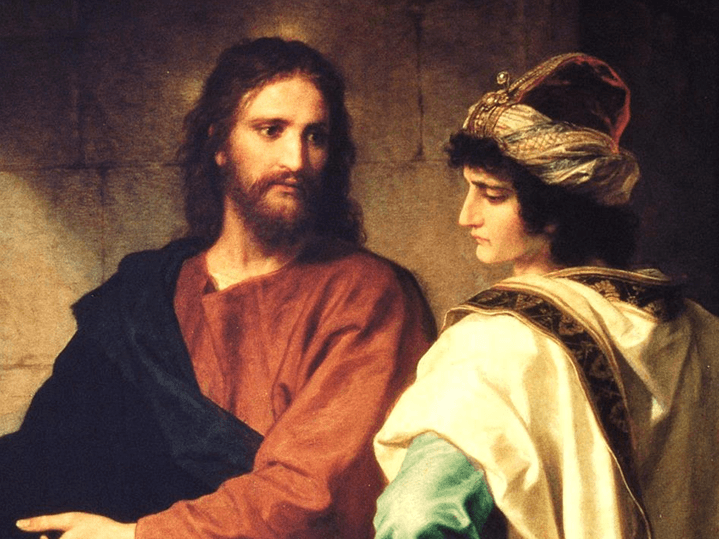MONDAY, 8TH WEEK IN ORDINARY TIME GOSPEL COMMENTARY. THE RICH YOUNG MAN (Mk 10:17-27)

GOSPEL
Mk 10:17–27
As Jesus was setting out on a journey, a man ran up, knelt down before him, and asked him, “Good teacher, what must I do to inherit eternal life?” Jesus answered him, “Why do you call me good? No one is good but God alone. You know the commandments: You shall not kill; you shall not commit adultery; you shall not steal; you shall not bear false witness; you shall not defraud; honor your father and your mother.” He replied and said to him, “Teacher, all of these I have observed from my youth.” Jesus, looking at him, loved him and said to him, “You are lacking in one thing. Go, sell what you have, and give to the poor and you will have treasure in heaven; then come, follow me.” At that statement, his face fell, and he went away sad, for he had many possessions.
Jesus looked around and said to his disciples, “How hard it is for those who have wealth to enter the Kingdom of God!” The disciples were amazed at his words. So Jesus again said to them in reply, “Children, how hard it is to enter the Kingdom of God! It is easier for a camel to pass through the eye of a needle than for one who is rich to enter the Kingdom of God.” They were exceedingly astonished and said among themselves,
“Then who can be saved?” Jesus looked at them and said, “For men it is impossible, but not for God. All things are possible for God.”
COMMENTARY FROM THE NAVARRE BIBLE, ST. MARK (WITH PERMISSION)
The rich young man
- 17-18 As Mt 19:16 makes clear, the young man approaches Jesus as an acknowledged teacher of the spiritual life, in the hope that he will guide him towards eternal life. It is not that Christ rejects the praise he is offered: he wants to show the depth of the young man’s words: he is good, not because he is a good man but because he is God, who is goodness itself.
- So, the young man has spoken the truth, but he has not gone far enough. Hence the enigmatic nature of Jesus’ reply and its profundity. The young man’s approach is upright but too human; Jesus tries to get him to see things from an entirely supernatural point of view. If this man is to really attain eternal life he must see in Jesus Christ not just a good master but the divine Saviour, the only Master, the only one who, because he is God is goodness itself. Cf. note on Mt 19:16-22.
- 19 Our Lord has not come to abolish the Law but to fulfil it (Mt 5:17). The commandments are the very core of the Law and keeping them is necessary for attaining eternal life. Christ brings these commandments to fulfilment in a double sense.
- First, because he helps us discover their full implications for our lives. The light of Revelation makes it easy for us to grasp the correct meaning of the precepts of the Decalogue — something that human reason, on its own, can only achieve with difficulty.
- Second, his grace gives us strength to counter our evil inclinations, which stem from original sin. The commandments, therefore, still apply in the Christian life: they are like signposts indicating the way that leads to heaven.
- 21-22 Our Lord knows that this young man has a generous heart. This is why he treats him so affectionately and invites him to greater intimacy with God. But he explains that this means renunciation — leaving his wealth behind so as to give his heart whole and entire to Jesus. God calls everyone to holiness, but holiness is reached by many different routes. It is up to every individual to take the necessary steps to discover which route God wants him to follow. The Lord sows the seed of vocation in everyone’s soul, to show him the way to go to reach the goal of holiness, which is common to all.
- In other words, if a person does not put obstacles in the way, if he responds generously to God, he feels a desire to be better, to give himself more generously. As fruit of this desire he seeks to know God’s will: he prays to God to help him, and asks people to advise him. In responding to this sincere search, God uses a great variety of instruments. Later, when a person thinks he sees the way God wants him to follow, he may still not take the decision to go that way : he is afraid of the renunciation it involves : at this point he should pray and deny himself if the light — God’s invitation — is to win out against human calculation. For, although God is calling, man is always free, and therefore he can respond generously or be a coward, like the young man we are told about in this passage. Failure to respond generously to one’s vocation always produces sadness.
- 21 “In its precise eloquence”, John Paul II points out, commenting on this passage, “this deeply penetrating event expresses a great lesson in a few words: it touches upon substantial problems and basic questions that have in no way lost their relevance. Everywhere young people are asking important questions — questions on the meaning of life, on the right way to live, on the scale of values: ‘What must I do . . .?’ ‘What must I do to share in everlasting life?’ . . . To each one of you I say therefore: heed the call of Christ when you hear him saying to you: ‘Follow me!’ Walk in my path! Stand by my side! Remain in my love! There is a choice to be made: a choice for Christ and his way of life, and his commandment of love.
- “The message of love that Christ brought is always important, always relevant. It is not difficult to see how today’s world, despite its beauty and grandeur, despite the conquests of science and technology, despite the refined and abundant material goods that it offers, is yearning for more truth, for more love, for more joy. And all of this is found in Christ and in his way of life…Faced with problems and disappointments, many people will try to escape from their responsibility: escape in selfishness, escape in sexual pleasure, escape in drugs, escape in violence, escape in indifference and cynical attitudes. But today, I propose to you the option of love, which is the opposite of escape. If you really accept that love from Christ, it will lead you to God. Perhaps in the priesthood or religious life; perhaps in some special service to your brothers and sisters: especially to the needy, the poor, the lonely, the abandoned, those whose rights have been trampled upon, or those whose basic needs have not been provided for. Whatever you make of your life, let it be something that reflects the love of Christ” (Homily on Boston Common).
- 22 “The sadness of the young man makes us reflect. We could be tempted to think that many possessions, many of the goods of this world, can bring happiness. We see instead in the case of the young man in the Gospel that his many possessions had become an obstacle to accepting the call of Jesus to follow him. He was not ready to say yes to Jesus, and noto self, to say yes to love and no to escape. Real love is demanding. I would fail in my mission if I did not clearly tell you so. For it was Jesus — or Jesus himself — who said: ‘You are my friends if you do what I command you’ (in 15:14). Love demands effort and a personal commitment to the will of God. It means discipline and sacrifice, but it also means joy and human fulfilment.
- “Dear young people: do not be afraid of honest effort and honest work; do not be afraid of the truth. With Christ’s help, and through prayer, you can answer his call, resisting temptations and fads, and every form of mass manipulation. Open your hearts to the Christ of the Gospels — to his love and his truth and his joy. Do not go away sad!…
- “Follow Christ! You who are married: share your love and your burdens with each other; respect the human dignity of your spouses; accept joyfully the life that God gives through you; make your marriage stable and secure for your children’s sake.
- “Follow Christ! You who are single or who are preparing for marriage. Follow Christ! You who are young or old. Follow Christ! You who are sick or ageing; who are suffering or in pain. You who feel the need for healing, the need for love, the need for a friend — follow Christ!
- “To all of you I extend — in the name of Christ — the call, the invitation, the plea: ‘Come and follow Me” (John Paul II, Homily on Boston Common).
Poverty and renunciation
- 23-27 The reaction of the rich young man gives our Lord another opportunity to say something about the way to use material things. In themselves they are good: they are resources God has made available to people for their development in society. But excessive attachment to things is what makes them an occasion of sin. The sin lies in “trusting” in them, as if they solve all life’s problems, and turning one’s back on God. St Paul calls covetousness idolatry (Col 3:5). Christ excludes from the Kingdom of God anyone who becomes so attached to riches that his life is geared around them. Or, more accurately, that person excludes himself.
- Possessions can seduce both those who already have them and those who are bent on acquiring them. Therefore, there are — paradoxically — poor people who are really rich, and rich people who are really poor. Since absolutely everyone has an inclination to be attached to material things, the disciples see salvation as an impossible goal: “Then who can be saved?” No one, if we rely on human resources. But God’s grace makes everything possible. Cf. note on Mt 6:11.
- Also, not putting our trust in riches means that anyone who does have wealth should use it to help the needy. This “demands great generosity, much sacrifice and unceasing effort on the part of the rich man. Let each one examine his conscience, a conscience that conveys a new message for our times. Is he prepared to support out of his own pocket works and undertakings organised in favour of the most destitute? Is he ready to pay higher taxes so that the public authorities can intensify their efforts in favour of development?” (Paul VI, Populorum progressio, 47).
Stay updated: subscribe by email for free TO OUR NEW WEBSITE www.catholicsstrivingforholiness.org (PUT YOUR EMAIL IN THE SUBSCRIBE WIDGET).
We are also in www.fb.com/Catholicsstrivingforholiness. Kindly help more people in their Christian life by liking our page and inviting your family, friends and relatives to do so as well. Thanks in advance and God bless you and your loved ones! Fr. Rolly Arjonillo

